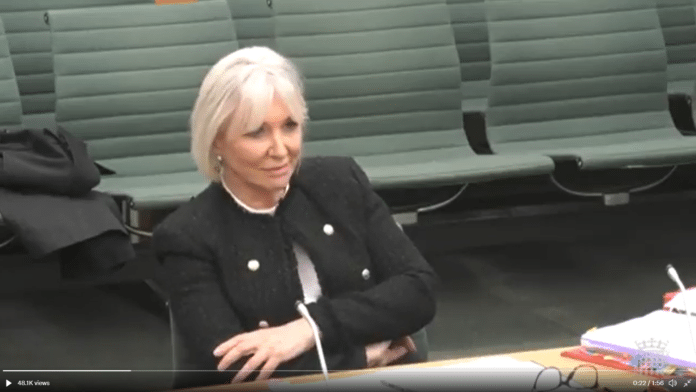If only Dorries had only fantasised about the big ball of puss instead of copying it her political career may have continued a little longer. Now, if Sunak wants to look slightly more honest than Johnson, she looks doomed.
The cross-party Culture Committee on which I sit has published a report concluding that Nadine Dorries gave us wholly inaccurate evidence when she appeared before us as Culture Secretary. Misleading parliament is serious. I have sent our report to the parliamentary authorities. pic.twitter.com/so0CoPmXuC
— JOHN NICOLSON M.P. (@MrJohnNicolson) October 28, 2022
What about the Ministerial Code?
Like the rules that govern debate in the Commons, this is available online.
It states that “holders of public office should be truthful” and that: “It is of paramount importance that ministers give accurate and truthful information to parliament, correcting any inadvertent error at the earliest opportunity. Ministers who knowingly mislead Parliament will be expected to offer their resignation to the Prime Minister.”
But the Ministerial Code is not law, and it is ultimately up to the Prime Minister to decide how to interpret and enforce it.
The convention used to be that ministers offered their resignation if they broke the code. In 2018, Amber Rudd resigned as Home Secretary after “inadvertently” misleading a select committee.
But this convention is not always followed now. In November last year, an inquiry into accusations of bullying against the Home Secretary, Priti Patel, found that she had broken the Ministerial Code.
Ms Patel apologised but did not offer her resignation and Boris Johnson took no further action. As he alone is responsible for enforcing the code, the Home Secretary kept her job.
Only a prime minister can order an investigation into whether the code has been breached in the first place, creating an obvious difficulty if it is the head of the government who is accused of breaking it.
Nolan Principles
The “seven principles of public life” were first set out by Lord Nolan in 1995. The sixth principle is honesty, and the text states that “holders of public office should be truthful”.
Like the Ministerial Code, the Nolan Principles are not law, and no punishment is set out for breaking them.
The principles are taken into account when the authorities are investigating MPs for breaking their code of conduct, but the Parliamentary Commissioner for Standards in the Commons cannot investigate what MPs say when they are in the chamber or probe the actions of ministers.
Contempt of Parliament
The opposition leaders’ letter refers to alleged “contempt of the House” – a phrase which does have some force in law.
You can be found in contempt of parliament if you are caught “deliberately attempting to mislead the House or a committee (by way of statement, evidence, or petition)”.
The law applies to members and non-members – like people giving evidence in front of select committees. But it’s not clear what powers, if any, parliament has to actually punish those who hold it in contempt.
The House of Commons can theoretically fine people for contempt, but no fine has been imposed since 1666.
We have seen in recent years how individuals and even entire governments have been ruled in contempt of parliament but faced no consequences other than public embarrassment.
Despite referring to the law of contempt in their letter, the opposition leaders who accuse Boris Johnson of dishonesty do not appear to intend to pursue a case against him.
After meeting with the Speaker, the leaders said in a joint statement on Tuesday: “A number of possible measures were discussed, including learning from the more transparent and high-profile Scottish model of correcting the record.
“The six leaders will be writing to the Chair of the Procedure Committee to follow up on these discussions.”
The verdict
It’s easier to get thrown out of the House of Commons for calling someone a liar than for lying itself.
Despite often coming under fire from disgruntled viewers, the Speaker of the House does not have any power to police the truthfulness of debates in the chamber.
And other codes of conduct which mention honesty, like the Nolan Principles and the Ministerial Code, are essentially voluntary.
In fact, much of the British political system rests on the assumption that politicians will choose to behave honourably, and there are few sanctions in place for those who defy the conventions.
Dr Alice Lilley from the Institute of Government told us: “Misleading Parliament is a serious matter.
“The convention has always been that ministers who mislead Parliament are expected to resign, and this is set out in the Ministerial Code. But enforcing this convention is more complicated.
“It is ultimately up to the prime minister to decide what happens to ministers judged to have broken the Code.
“And Parliament has very few powers to punish a minister for misleading it. The Commons Speaker might make some pointed remarks that make their irritation clear, but it isn’t their job to determine whether ministers are telling the truth—or the consequences if they aren’t.”
Penny Lane
Join us in helping to bring reality and decency back by SUBSCRIBING to our Youtube channel: https://www.youtube.com/channel/UCQ1Ll1ylCg8U19AhNl-NoTg and SUPPORTING US where you can: Award Winning Independent Citizen Media Needs Your Help. PLEASE SUPPORT US FOR JUST £2 A MONTH https://dorseteye.com/donate/








The sad fact about all of this is that people like Johnson, Dorries, Patel and many others know the weaknesses inherent in these processes and deliberately exploit that fact..! Until these issues rest upon a definitive and legally binding punishment system, and NOT the highly debatable and now greatly discredited “word of honour” of the miscreant member, there will be no chance of 100% of honesty existing in the House. There are cases extant and unanswered, let’s face it, that during the past 12 years of Tory governance would probably have put 10% of its members temporarily, or even permanently, out of office..!